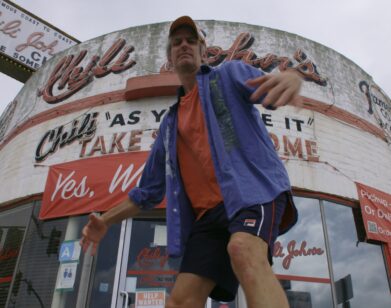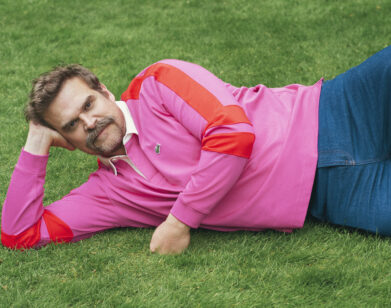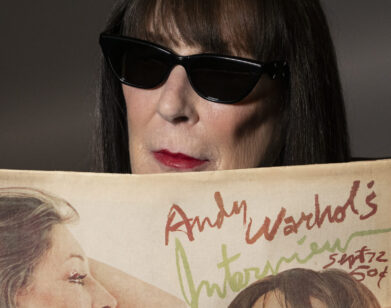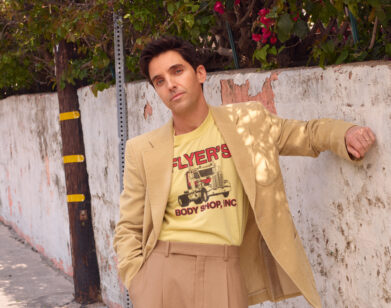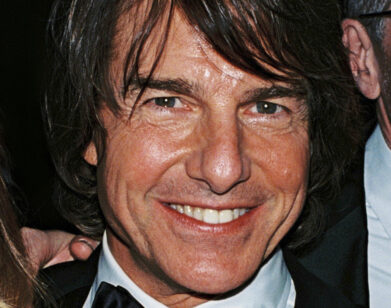Olga Kurylenko on Malick and Cruise
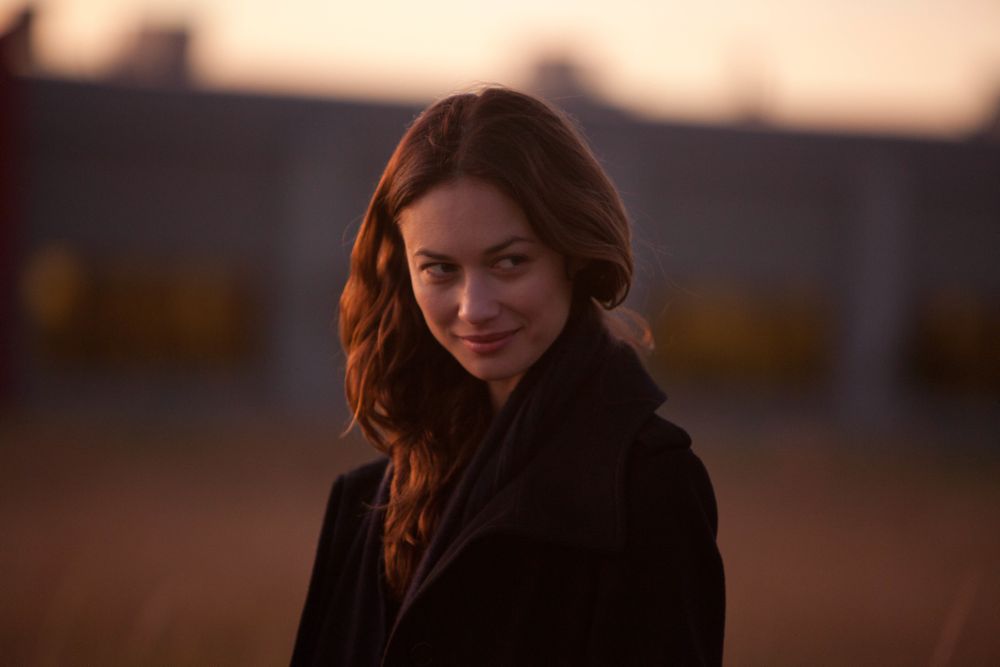
ABOVE: OLGA KURYLENKO IN TO THE WONDER
Vogue, Elle, Marie Claire, and Maxim—Olga Kurylenko graced countless magazine covers before transitioning into acting. She did pick up one skill as a model that proves essential in Terrence Malick’s new film, To The Wonder: the Ukrainian beauty moved at age 16 to Paris, where she became fluent in French. In To The Wonder, Kurylenko plays a French woman who enchants, marries, and ultimately leaves Ben Affleck. Like Javier Bardem, who portrays a Spanish-speaking priest, Kurylenko’s scenes are entirely subtitled, imparting a foreign-film texture to the Oklahoma-based story.
Malick is among the most polarizing of filmmakers; at Cannes, The Tree of Life was vociferously cheered and booed at screenings, before winning the Palme d’Or. His films have been called peerless, brilliant masterpieces and overly arty, self-parodying perfume commercials. While To the Wonder at times flirts with redundancy (particularly the wandering through reeds and uphill shots, both recurring motifs since Days of Heaven), we are among those that consider Malick a master, if not genius. As in The Tree of Life, To the Wonder aspires to a complete deconstruction of cinematic conventions and linear narratives. His scenes range in length from a few seconds to many minutes; some contain dialogue, most consist of silent movement—of physical touching between characters or utter stillness. Many are overlaid by whispered voiceovers of lyrical fragments. Malick attempts an impressionistic portrayal of divinity in its splendor. His films are visual poems.
Clearly there are autobiographical elements in To the Wonder: the deeply spiritual Austin-based filmmaker spent part of his childhood in Oklahoma, had a French wife, and studied philosophy and theology at Harvard. As Marina, Kurylenko’s performance is delicate, damaged, and ephemeral. Kurylenko portrayed a vampiress in Paris, je t’aime, a Bond girl opposite Daniel Craig in Quantum of Solace, and co-starred with Colin Farrell and Christopher Walken in Seven Psychopaths. One week after To the Wonder’s release, the sci-fi thriller Oblivion opens, starring Kurylenko, Tom Cruise, and Morgan Freeman. We chatted with the sudden It girl about her leading men and were treated to rare glimpses into the enigma that is Terrence Malick.
LORRAINE CWELICH: What was it like working with Ben Affleck in this film?
OLGA KURYLENKO: In addition to being a great director, he’s obviously also a great actor. In this film he plays a very shut-down, cold character; I would imagine it would be frustrating for him not to be able to express himself. He couldn’t talk much about his feelings; mostly it was working with the body and facial expression, so it was a completely different approach. There was a lot of improvisation.
CWELICH: Tell us about working with Terrence Malick, especially his process.
KURYLENKO: He gives lots of freedom to his actors. He tells the story without working from a script. Each day he would give us papers with a “thought for the day.” Basically his style is for the actors to soak in those thoughts, and it’s for you to decide how you want to express those thoughts—whether you want to use movement or be silent or speak or use his exact written words or say the same thing with your own words. As long as we understood the context, it was fine with Terrence. Of course he corrects you and directs you as you go along. He actually speaks to actors during takes. It’s amazing. He really takes his time—he doesn’t stick to a shooting schedule. We could shoot a particular scene many times during the day or even come back to it another day and try it in a different location. He’s very experimental, which is why a lot of things are deleted.
CWELICH: Jessica Chastain, Amanda Peet, Rachel Weisz and other actors shot scenes that did not make it into the final version of the film. What can you tell us about their storylines?
KURYLENKO: I had interaction with Rachel, who played Ben’s sister. It was a strong story, but I probably shouldn’t say too much about them, since they weren’t in the final version.
CWELICH: Christian Bale was originally cast in Ben Affleck’s role. Did you actually ever shoot scenes with Bale, or did he drop out before shooting began?
KURYLENKO: I admire Christian’s work as an actor but never actually met him, so that would have [happened] before shooting began.
CWELICH: Malick is known for only working with natural light in his films. He did not use any artificial lighting in this film as well?
KURYLENKO: There were no light installations, only [the cinematographer] following you with a camera on his shoulder.
CWELICH: What do you think Malick is saying, particularly with your character, about love, and with Javier’s character, about faith?
KURYLENKO: That both love and faith transcend the person’s feelings at any given time. Love and faith are both a search, a process, it doesn’t stay the same; it comes and goes. In some people, it’s asleep for a long time and then it wakes up as it evolves. You see with Marina her love relationship transcending and changing as it went through stages. The same with Javier as Father Quintana, you see this priest who has his faith, then loses it; he talks to God and hears nothing back. But then as he works with people, it comes alive again. I don’t think there’s ever a moment when you can actually say, “I found it.” Even when you think you did, the next moment something happens and it can drift away. It’s about the evolution of love and faith. It constantly surprises us.
CWELICH: In the evolution of Marina’s relationship with Neil, she goes from being deeply in love to being deeply unhappy. You mentioned Neil being cold and shut-down. Were there other reasons for the loss of her love?
KURYLENKO: This is just my interpretation, but I think she was predisposed to unhappiness; I think she is mentally unstable. She craves love; she needs a man who can really meet her needs for emotional connection, full of being able to communicate with her. That wasn’t Neil’s personality.
CWELICH: In the past, there were many years between Malick’s films and now he is working quickly; The Tree of Life in 2011, To the Wonder in 2012, Knight of Cups in 2013, Voyage of Time in 2014 and another untitled project. Did he ever talk about the reasons for the change in his pace or mention any of his upcoming films?
KURYLENKO: I think artists are inspired at different times for different reasons; but no, he didn’t talk about any of his upcoming films.
CWELICH: Tell us about your character in Oblivion.
KURYLENKO: Julia Rusakova makes Jack [Tom Cruise] question everything he knows about the world and what happened to it. They go on an unexpected and quixotic journey, which is exciting and terrifying at times. She is the trigger that makes him do great things.
CWELICH: What was it like working with Tom Cruise?
KURYLENKO: He is such a lovely person and great actor to be around. He has a great personality; he’s really fun and excited about everything he does, very enthusiastic. He’s a great inspiration. He doesn’t go off in his trailer; he’s always on-set and accessible. He’s helpful to his co-stars and very supportive. If the camera is on the other actor and he’s not in the shot, he’ll still be there for you.
TO THE WONDER OPENS TODAY, APRIL 12. OBLIVION OPENS NEXT FRIDAY, APRIL 19.

